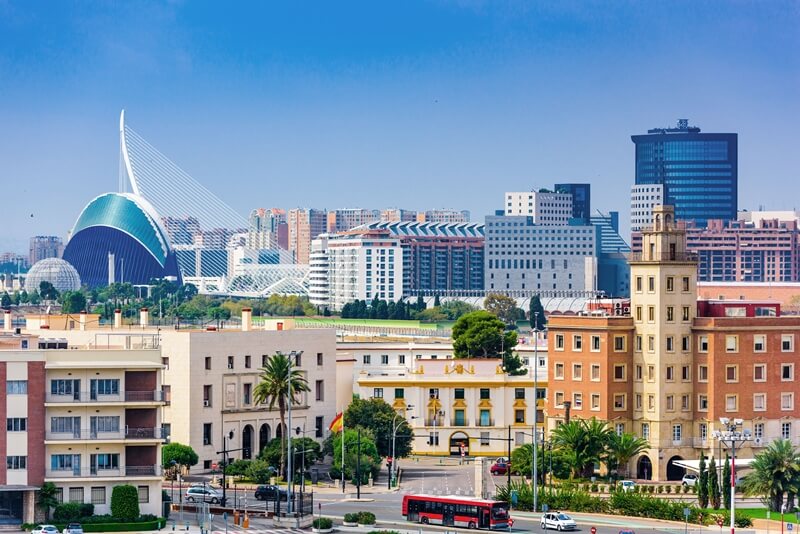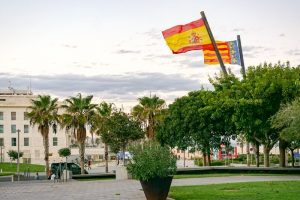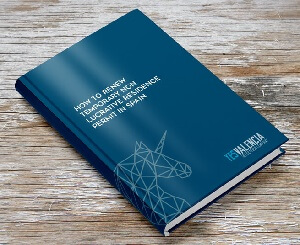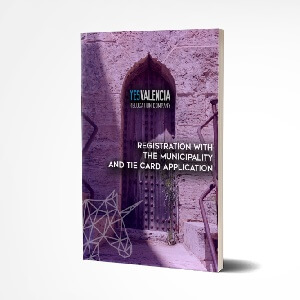
What is now happening with the real estate market in Valencia?
Renting vs purchasing
Although the cost of the property in Valencia is more affordable than in Madrid and Barcelona, as regards to the rental market it cannot be considered cheap anymore. There is not much available for lower than 700 euros, and the rental market moves within the average price range of 800 to 1500 euros a month. Currently renting a place in Valencia city costs proportionally more than purchasing it, so it is quite logical that more locals and expats decide to purchase a property.
Investing in Valencia
Valencia is to be considered a place for wise investment. Being the third biggest Spanish city by the Mediterranean sea with its laid back life style, offering loads of cultural, economic and professional opportunities, and still a good price – quality performance compared to other European cities of the same size and characteristics, Valencia has become a very attractive place to invest. We believe that Valencia will grow in size, economics and attract even more people, so the average real estate cost is expected to increase.
Is there another recession around the corner?

Las Arenas beach in Valencia
As the economic cycles do have ups and downs, there are experts expecting another recession within a couple of years. Valencia has almost reached the level where it was before 2008 recession, new construction is back and the market is getting hot. No one can predict the exact scenario of when the recession will hit the economy and what shape it will have this time, but that is one more reason to purchase wisely – the right choice of the location and the property itself will be the key factors of whether your property value will be affected by a possible recession or not.
In this post we will outline the key points to be aware of when preparing for purchasing the property in Valencia, we will not go into specifics of different neighbourhoods or discuss purchase prices as that would require a separate post with more extended analysis.
Preparation
When planning to purchase a property in Valencia, there are several important questions to consider before starting the process:
Spanish bank account is one of them. When signing the purchase before the notary, the payment is completed by handing in the bank cheques issued on the name of seller, meaning that you will need to have sufficient funds on your Spanish bank account. You do not need the NIE number or resident permit to open a bank account, there are quite a few banks that offer good non – resident bank account options. If you plan to move funds from abroad, you should pay close attention to the transfer reception fees (usually transfers within the EU are free of charge, but most Spanish banks apply high fees for international wire transfer reception – usually it is a percentage of the amount, minimum 18 euros per transfer). So, if you plan to wire funds directly from a non EU account, it is a good idea to do a research on the best bank account option to save on fees. There are some accounts that charge quite reasonable monthly fee and allow international transfer reception free of charge.
Let yourself enough time to move funds as some unexpected delays may occur. As a part of the state policies against money laundering, the incoming wire transfers to recently opened non-resident accounts are monitored by the Spanish Central Bank and occasionally can be blocked while additional information on the source of funds is requested.
As it is very likely you will be moving funds from overseas, there are several alternatives to explore to possibly save on costs by getting better exchange rates and cutting down on international transfer fees. Foreign exchange broker and international payment providers like CurrenciesDirect can be a great help in monitoring the exchange rates and advising on the right timing, as well as completing the transfers at more competitive rates that traditional banks would offer. This particular company based in the UK has been in the market from 1996, and has got an office in Valencia where to get more personalised customer service. There are many more exchange brokers and money transfer services operating online, probably one of the most popular among expats is Transferwise. Also, please note that some banks may have daily transfer limitations and that should be taken into account when setting the purchase date.
If your income is generated abroad and you do not hold a resident permit or not even planning to get one any time near, you still may consider applying for a mortgage from a Spanish bank. Not all banks work with non-residents, but there are several banks that do approve mortgages to non-residents. Of course, your income has to be backed by showing according documents such like tax returns etc. and the banks decision may depend on the country of your current residency, the currency of your income, and other important factors etc. You can check your options though a broker, such like Mortgage Direct – a company founded and based in Valencia, or approach banks directly.
The NIE number (in Spanish – Número de Identidad de Extranjero) is the foreigner identification number that you will need to complete the purchase and it is one of the aspects not to overlook as not getting the NIE number on time may lead to unpleasant and stressful situations. In Valencia, to solicit the NIE number you are required to book an appointment for the office on calle Bailen 9. Currently the waiting time can take up to a month, and do not panic if there are no appointments available, then you simply have to keep checking until you get one. Once you have an appointment, the process for the EU citizens is pretty much straight forward. In case of non EU citizens you will be asked to provide additional documents to justify the reason why you need the NIE for, such as, a statement of the intention to purchase a property signed before the notary, POA including the property details and similar. If you are not in Valencia to solicit the NIE, another person can do in on your behalf with POA, or you could also approach the nearest Spanish Consulate in the country of residency.
Steps of the purchase
Property hunting is one of the most exciting parts of the property purchase process, but it can also be quite stressful due to the lack of communication, or misleading information on the process, costs to expect, not knowing the city and characteristics of different areas and other specifics of the real estate market in Valencia city.
… the same property in Valencia can be listed by several agencies, developer, private landlord, etc., and they will only show you and try to sell their own listings.
To start with, it is important to know that there is not a united data base for available properties,
There are hundreds of real estate agencies operating in Valencia and if you want to view some specific properties you probably have found online at one of the search websites such like idealista.com or fotocasa.es, you will have to contact them one by one. The real estate agencies are not strictly regulated, meaning that some are more professional and liable than others. Most of the real estate agencies do not speak English, so if you want to view all properties of your interest, the Spanish language skills will be very useful when dealing in Valencian market. The most effective communication form is via phone, and don’t be surprised if you do not receive respond to your web form or email requests, especially if they are sent in other language that Spanish.
For those considering a serious investment in property in Valencia, the most logical option is to hire a professional property finder who works in their interest and not for the seller.
Once you have spotted the property you would like to purchase, it is advisable to go through the checklist to avoid any potential problems on the way. Sometimes there is not much time to think about the property, but bringing an architect or another professional in to inspect building and the property itself, advice on the remodel cost, permits, time, and possible solutions can be very useful.
Preliminary check on the property
One of the main steps is to check the ownership, any possible debts, restrictions, the size of the property etc. Usually that is done by soliciting the Property Registry Filing (in Spanish – nota simple) from the public property register. Apart from that, you should make sure the property is current with utility bill payments (in Spanish – suministros), community charges (in Spanish – gastos comunitarios), property tax (in Spanish – IBI).
Making an offer
If you have found the right place for you, the first step is to make an offer. It will depend on the agency you deal with, but some real estate agencies may request an initial deposit between 500 and a couple of thousand euros to make a formal offer. If your offer is accepted, that amount of money will be deducted from the total of the purchase, but if rejected – it will be refunded. In most of the cases some negotiation is expected, but the exact amount will depend on each individual case.
The pre-agreement
Once the parties have agreed on the purchase price, usually the next step is signing the pre-agreement (in Spanish – el contrato de arras) which is a commitment of both parties to complete the purchase. In this contract the buyer and the seller agree on the price, purchase closing deadline, and other conditions the parties consider a significant part of the deal. At this stage the buyer pays a percentage of the agreed purchase price, quite commonly it is 10%, with a condition that if the buyer backs out, they lose the deposit, but if the seller backs out of the contract, they have to pay double.
Property surveyor
In case of investment, getting an appraisal of the property is your choice, but if you do require a mortgage, the bank will assign a property surveyor (in Spanish – tasador) to inspect the property and provide a report with the appraised value of the property. The bank will give the mortgage only to certain percentage of that value, so it is quite important to have some backup funds prepared in case the value is lower than the agreed purchase price.
The closing
The closing has to be completed before the notary. If it is not convenient for you to be present at the closing, a trusted person can sign on your behalf with a power of attorney. The power of attorney also has to be signed before the notary in Spain, or it can be issued at one of the Spanish Consulates overseas. In Spain, usually the remaining purchase amount is paid by a bank check on the seller’s name, so it is important to notify your bank in Spain the date of the operation and the details to issue the check. After the notary has checked identity of both parties, the sellers title of property and the buyer has provided the payment, the parties sign the contract. After that, the property has to be transferred on buyer’s name at the Property Registry, but this part usually is done by a private agency (In Spanish – gestoria) that handles tax payments and paperwork to formalize the deeds of the property.
Costs of buying a property in Valencia
On average, you should reserve 12-15% of the purchase value for additional costs and taxes, here are the main costs to be ready for:
- The real estate agencies charge 2.5% to 3% fee for the total of the purchase value, and their service fees are subject to the VAT 21% that usually is charged on top of it. Some of the properties are listed by the private landlords (In Spanish – particular) that can be quite significant saving;
- Hiring a lawyer to assist with the legal side of the purchase is not mandatory in Spain, but quite advisable if you are new to the system and don´t speak the language. There is no fixed lawyer´s fees, but it can cost starting from 500 euros + VAT up 1% of the purchase value;
- Property surveyor will cost from 200 to 700 euros, and is mandatory if the buyer needs a mortgage. Otherwise it is optional, but advisable as an experienced architect may spot things it is harder to notice and help you to save some worries in future;
- Notary´s fees, it is paid by the buyer or expenses can be shared (depends on what the parties agree on). Notary rates may vary between 600 euros up to 1000 euros plus VAT;
- Property registry costs are approximately 400 to 650 euros and gestoría costs 200 to 400 euros;
- Property transfer tax in Valencia is 10% of the purchase value.
After the purchase
Once you have completed the process of buying your dream property in Valencia, you should set up utilities in your name, notify the board of neighbours about the change of the ownership and follow up on the registration process to make sure the property is registered in your name and the taxes are paid. Also it is always a good idea to get a home insurance, which would cover any damage and liabilty before the third parties.
And after all – enjoy becoming a part of this wonderful city and everything it can offer!






7 Responses
What is a property tax in Valencia as of 2019. If property is purchased for 400,00 euros, what will a property tax for a new owner and should be be paid at once or brake down by month?
Thank you
Property transfer tax in Valencia for 2019 is the same it was the last year which is 10% of the purchase value. It should be paid fully in 30 days after the purchase. However, for habitual residence property transfer tax in Valencia can be broken down for a period of up to 3 years, if the property size does not exceed 120m2.
Excellent blog post. Thanks for the information.
Thanks for all this information. I understand that a property needs a cédula de habitabilidad before purchase in the Comunidad Valenciana. If it’s an old, rural property (masía), how does one go about getting this?
Thank you Samantha for reading our blog post. As your question is quite specific and would require an indivdual approach depending on your exact situation, unfortunately we will not be able to provide an accurate answer. Please do not hesitate to contact us if you require any of our services or assistance with property purchase.
Hello, my name is Keith and I live in Washington DC, I would like to make a real estate purchase in October, is it possible to do a rental with the intent to purchase
Great tips. Another suggestion would be to visit the property with someone who understands if there are any faults or issues with it.